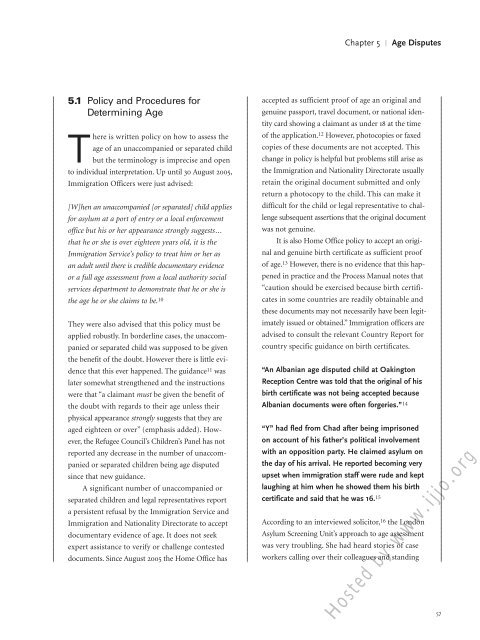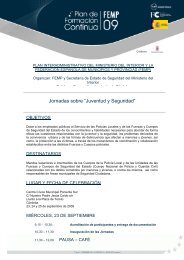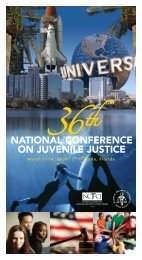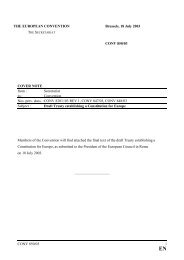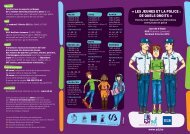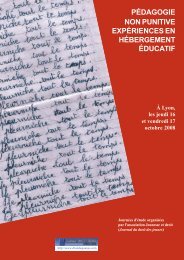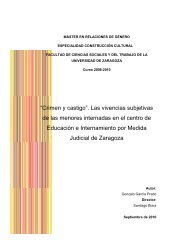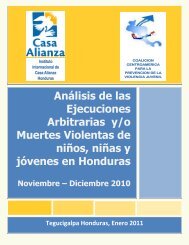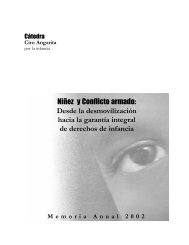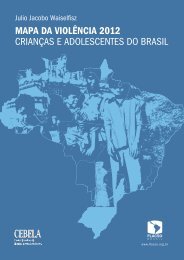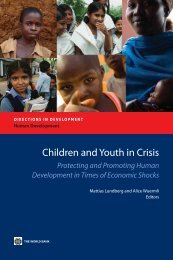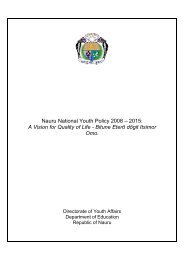Hosted by www.ijjo.org
Hosted by www.ijjo.org
Hosted by www.ijjo.org
You also want an ePaper? Increase the reach of your titles
YUMPU automatically turns print PDFs into web optimized ePapers that Google loves.
Chapter 5 | Age Disputes<br />
5.1 Policy and Procedures for<br />
Determining Age<br />
There is written policy on how to assess the<br />
age of an unaccompanied or separated child<br />
but the terminology is imprecise and open<br />
to individual interpretation. Up until 30 August 2005,<br />
Immigration Officers were just advised:<br />
[W]hen an unaccompanied [or separated] child applies<br />
for asylum at a port of entry or a local enforcement<br />
office but his or her appearance strongly suggests...<br />
that he or she is over eighteen years old, it is the<br />
Immigration Service’s policy to treat him or her as<br />
an adult until there is credible documentary evidence<br />
or a full age assessment from a local authority social<br />
services department to demonstrate that he or she is<br />
the age he or she claims to be. 10<br />
They were also advised that this policy must be<br />
applied robustly. In borderline cases, the unaccompanied<br />
or separated child was supposed to be given<br />
the benefit of the doubt. However there is little evidence<br />
that this ever happened. The guidance 11 was<br />
later somewhat strengthened and the instructions<br />
were that “a claimant must be given the benefit of<br />
the doubt with regards to their age unless their<br />
physical appearance strongly suggests that they are<br />
aged eighteen or over” (emphasis added). However,<br />
the Refugee Council’s Children’s Panel has not<br />
reported any decrease in the number of unaccompanied<br />
or separated children being age disputed<br />
since that new guidance.<br />
A significant number of unaccompanied or<br />
separated children and legal representatives report<br />
a persistent refusal <strong>by</strong> the Immigration Service and<br />
Immigration and Nationality Directorate to accept<br />
documentary evidence of age. It does not seek<br />
expert assistance to verify or challenge contested<br />
documents. Since August 2005 the Home Office has<br />
accepted as sufficient proof of age an original and<br />
genuine passport, travel document, or national identity<br />
card showing a claimant as under 18 at the time<br />
of the application. 12 However, photocopies or faxed<br />
copies of these documents are not accepted. This<br />
change in policy is helpful but problems still arise as<br />
the Immigration and Nationality Directorate usually<br />
retain the original document submitted and only<br />
return a photocopy to the child. This can make it<br />
difficult for the child or legal representative to challenge<br />
subsequent assertions that the original document<br />
was not genuine.<br />
It is also Home Office policy to accept an original<br />
and genuine birth certificate as sufficient proof<br />
of age. 13 However, there is no evidence that this happened<br />
in practice and the Process Manual notes that<br />
“caution should be exercised because birth certificates<br />
in some countries are readily obtainable and<br />
these documents may not necessarily have been legitimately<br />
issued or obtained.” Immigration officers are<br />
advised to consult the relevant Country Report for<br />
country specific guidance on birth certificates.<br />
“An Albanian age disputed child at Oakington<br />
Reception Centre was told that the original of his<br />
birth certificate was not being accepted because<br />
Albanian documents were often f<strong>org</strong>eries.” 14<br />
“Y” had fled from Chad after being imprisoned<br />
on account of his father’s political involvement<br />
with an opposition party. He claimed asylum on<br />
the day of his arrival. He reported becoming very<br />
upset when immigration staff were rude and kept<br />
laughing at him when he showed them his birth<br />
certificate and said that he was 16. 15<br />
According to an interviewed solicitor, 16 the London<br />
Asylum Screening Unit’s approach to age assessment<br />
was very troubling. She had heard stories of case<br />
workers calling over their colleagues and standing<br />
<strong>Hosted</strong> <strong>by</strong> <strong>www</strong>.<strong>ijjo</strong>.<strong>org</strong><br />
57


